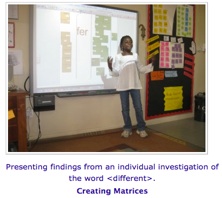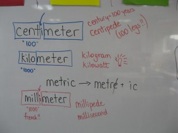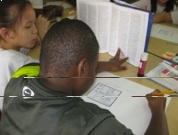


WordWorks’ Blogroll
The blogs described on this page are in addition to these and other websites and long recommended by WordWorks
•Real Spelling and LEX are excellent resources for teachers, but they are not “teacher-created” blogs about their classroom practice.
•Real Spellers is a teacher-created website, but it is a forum for any questions teachers or students may have during their studies. I highly recommend all of these sites. This page, however, focuses on blogs by teachers sharing the learning in their classrooms.
See more on these and other related sites here.
These blogs provide teachers with exceptional examples of the kind of learning regularly occurs in classrooms when instruction is built on the assumption that English spelling is well ordered and can therefore be investigated through scientific inquiry.
Further, the variety of content here helps illustrate that the instruction supported by WordWorks and Real Spelling is not a program to be followed (see note at bottom of page), but an introduction to facts about English spelling system that creative, inquisitive teachers can draw on to produce amazing learning experiences.
Teacher-Created Blogs Sharing Structured Word Inquiry and Effective use of Real Spelling Resources:
American Community School of Abu Dhabi
This blog represents an integral part of Jenn’s work as literacy coach helping teacher staff become a confident team of learners as they learn to work with Real Spelling resources and teach the written word through structured word inquiry from K-5.
See her full Literacybytes website that includes support for all sorts of literacy instruction including not only structured word inquiry but also other elements such as Lucy Calkins Writers and Reader’s workshop. See these sub-links for particular needs:
-
•WordStudy Warriors: Click this link to follow just the blog posts specifically tied to structured word inquiry with Real Spelling and WordWorks
-
•Modelled video lessons rom Kit 1 & 2 of the Real Spelling Tool Box: I can’t overstate the value of this resource. She is creating videos of overviews for each of the Kit 1 and 2 themes along with ideas for teaching at each of those levels. She models how aspects of each of these themes can be taught in classes from kinder to Grade 5. I encourage you to take her lead and have at least two teachers (same or different grades) teach from the same theme at the same time so that the teacher has a co-learner to work with. With so many modelled ideas for teaching from Jen, even teachers with no background should be able to get started! Thanks Jen! Click here to see the videos produced so far.
-
•Learning from <love>: Jen began her strategy of all teachers working from the same theme at the same time by spending one Valentine’s Day going to classrooms from each grade from K-5 teaching lessons from the very popular “Learning From Love” Real Spelling Theme. See videos of these lessons here. Click here for a pdf of this theme. (Readers may also be interested in this WW Newsletter with resources with lessons on the word <know> that could be taught to Kindergarten and up.)
-
Dan’s blog is filled with rich inquiry-led learning she guides in all subject areas. Click this link for his posts tagged as Language/Spelling/Word Study. Here is a favourite recent post of mine from Dan’s blog in which a student independently Skypes Real Spelling on his iPod as a resource to help him resolve a question (pictured right).
Author: Ilana McGrath, Grade 3 teacher (and alumna of every WordWorks Summer Course!)
International School of Manila
Ilana’s blog also illustrates the wonderful inquiry-led learning in all subject areas. To take a close look at her posts that involve structured word inquiry that crops up during any subject in her class. Here is a recent post that came up during math class. take a look at her posts with the “word study” tag.


Author: Sarah Pickles, Grade 4 teacher
Lincoln Community School, Accra, Ghana.
This wonderful website is part of Sarah’s graduate studies. TPACK stands for Technological Pedagogical Content Knowledge (see here). Explore Sarah’s site to see rich descriptions and applications of structured word inquiry in her classroom.
Summing up...
I know that more similar teacher blogs are in the process of being constructed right now. Of course there are many teachers doing amazing work with their students who have not shared their work in blog form. I encourage you to visit our index of slide shows to see more examples of this instruction.
This variety of teacher works helps reinforces the fact that WordWorks and Real Spelling are not programs to follow, but instead resources that teachers can use in their own way to guide their learning and instruction such that it is refined ever more around accurate understanding of the written word.
Copyright Susan and Peter Bowers 2010


Real Spelling & WordWorks: Not Programs!
A key point that can be difficult to communicate to schools is that there is no such thing as a Real Spelling or WordWorks “Program” Nor are these descriptors of any “teaching approach.” As simply as possible, here is how I explain the nature of Real Spelling and WordWorks as educational tools:
Real Spelling is a reference.
I think of Real Spelling is a complex, evolving, multi-media “encyclopedia” of how English spelling works. It would make as much sense to say that a school uses the “Real Spelling Program” as it would to say that they teach world history through the “encyclopedia program.” Similarly, it would not make sense to talk of the “encyclopedia instructional approach” to world history.
WordWorks is a professional training business.
Through our website, resources and on-line and on-site training and teacher resources, we help teachers understand and teach English spelling through scientific inquiry. We also offer strategies and support for bringing that kind of learning about English spelling through scientific inquiry into into the classroom. This brings us to the idea of an “instructional approach.
Structured Word Inquiry: An instructional approach
Unlike Real Spelling, WordWorks does articulate and support a specific instructional approach that schools consider taking on. See an articulation of this approach at this link. Simply put, however, structured word inquiry is simply the application of the principles of scientific inquiry to the study of English spelling in the classroom.











